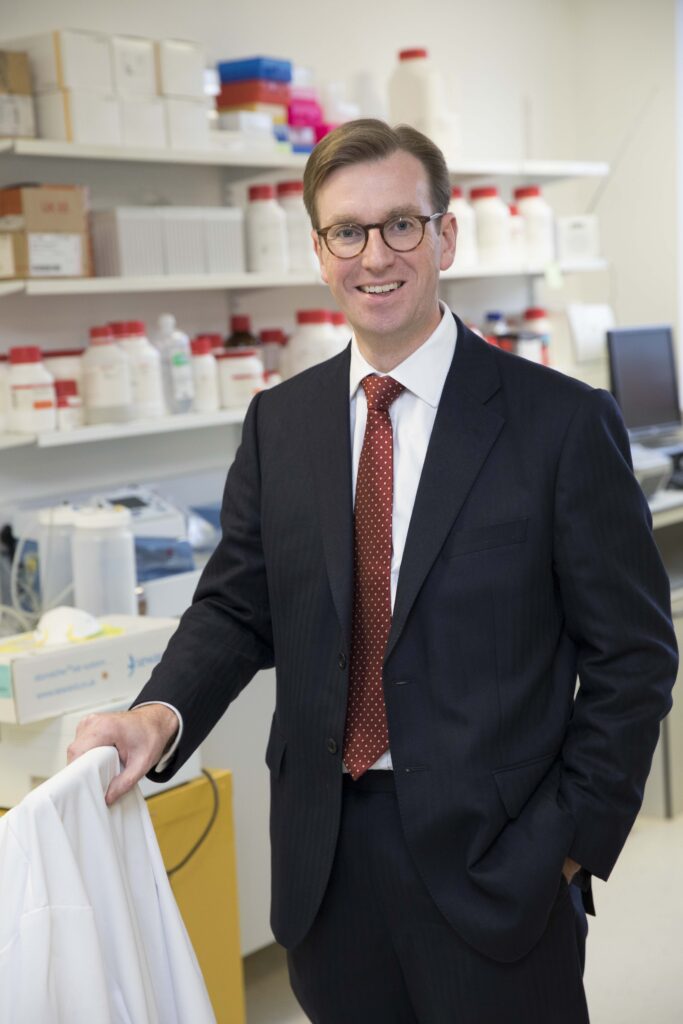Newcastle Hospitals is set to be part of the most extensive clinical study into liver cirrhosis ever conducted worldwide.
The ADVANCE (Accelerating Discovery: actionable NASH Cirrhosis Endpoints) study will be the most detailed observational study of its kind enrolling the largest number of patients and providing a detailed analysis of liver health.
The study is led Newcastle University, University of Edinburgh and leading research-driven global biopharmaceutical company, Boehringer Ingelheim.
Earlier diagnosis and new treatments needed
Approximately 444 million people worldwide are estimated to live with a condition referred to as nonalcoholic or metabolic dysfunction-associated steatohepatitis (NASH/MASH), an inflammatory liver disease that is caused by accumulation of fat in the liver.
Over time, NASH causes the formation of scar tissue leading in many cases to liver cirrhosis. This can result in serious complications, including liver failure or liver cancer and may result in the patient needing a liver transplant.
Currently there are no approved medicines for cirrhosis and so there is an urgent need for earlier diagnosis and new medicines to prevent MASH cirrhosis progression to liver failure, or to reverse the scarring of the liver once cirrhosis is established.
The study will include 200 patients with cirrhosis who will be recruited at specialist liver clinics at hospitals across the UK and Europe, including the Freeman Hospital, or through referral by their treating physician.

International experts in liver research
Professor Quentin Anstee, Professor of Experimental Hepatology at Newcastle University and Consultant Hepatologist at Newcastle upon Tyne Hospitals NHS Foundation Trust who is coordinating the global study explained:
“Building on Newcastle’s internationally recognized expertise in translational liver research, this study will reveal the fundamental disease processes driving cirrhosis”.
“We aim to work out why, even at the most advanced stages of liver disease, there is substantial variation in how the disease progresses with some people remaining well for many years whilst others rapidly experience liver failure or develop liver cancer. Working internationally with our collaborators, we will then use this knowledge to improve how patients are diagnosed, and to help develop new medicines.”
This £30M study is funded by Boehringer Ingelheim and reflects the company’s commitment to improve the lives of people living with cardiovascular, renal and metabolic diseases (CRM).
Better understanding
“Cardiovascular, renal, and metabolic diseases are the leading cause of death worldwide, accounting for up to 20 million deaths annually,” said Lykke Hinsch Gylvin, M.D., Chief Medical Officer at Boehringer Ingelheim. “At Boehringer Ingelheim we are focusing on understanding the whole patient and how to target specific disease mechanisms to address interconnected CRM diseases. We are very excited to work with our partners in the ADVANCE study to better understand the underlying disease processes and to bring much needed new treatments to patients with liver cirrhosis.”
Professor Neil Henderson, Professor of Tissue Repair and Regeneration at the University of Edinburgh and co-lead on the study, said;
“Liver disease has reached epidemic proportions worldwide. Therefore, there is a huge need to develop potent, new treatments for liver scarring. To help address this, over the last several years we have harnessed a new technology in Edinburgh called single cell RNA sequencing.
“Using this new technology has allowed us to study human liver scarring in high definition for the first time, and we hope that this state-of-the-art approach will allow us to accelerate the discovery of much-needed new treatments for patients with liver disease.”
His team is being supported by Edinburgh Innovations, the University’s commercialization service.
What does the study involve?
Participants will initially undergo a biopsy to collect a small sample of liver tissue so that detailed changes in gene expression in the liver can be assessed using advanced scientific techniques. They will then have blood tests and state-of-the-art MRI scans performed at regular time points over the next two years. The data generated will be combined to allow researchers to see how disease-related changes evolve in the body as cirrhosis progresses.
Yvonne’s story

Retired primary school headteacher, Yvonne Gray, was diagnosed with the liver disease metabolic dysfunction-associated steatohepatitis (MASLD) more than a decade ago.
The 68-year-old, from Sunderland, is a governor of the national adult liver patient charity group, LIVErNORTH, and strongly supports the ADVANCE study.
She said: “When I was diagnosed with my liver disease back in 2010, not much was generally known about MASLD, let alone any research being done into it.
“Although very common, MASLD is a largely silent disease that sneaks up on patients. Apart from fatigue and a constant discomfort in the upper right side of my abdomen, I was only aware of symptoms of my other conditions, not realising that my, so far undiagnosed, liver disease was progressing.
“I had ‘mild changes’ in my liver function blood tests and was only referred to a liver specialist after another consultant, dealing with my other conditions, asked for their opinion. Following a biopsy, I was shocked to be told my liver was at stage three of a four stage disease – the fourth stage being cirrhosis.
“I am excited and relieved that this research offers hope of better diagnostic tests so people are identified sooner, and at the possible discovery of new treatments that could prevent cirrhosis, or even reverse it.”
As an active member of LIVErNORTH, and the mother of a 39-year-old daughter, who has recently been diagnosed with MASLD, Yvonne is keen to get more patients involved in research to help raise awareness and find better treatments.
Yvonne added: “I am so appreciative, grateful, and lucky that I live in a region where world-leading research into MASLD is being undertaken by Newcastle University.
“I would encourage all liver patients to discuss getting involved in this innovative research with their own doctors.”
The study is supported by the National Institute for Health and Care Research (NIHR), which supports patients, the public and health and care organisations across England to participate in high-quality research.
- The international research consortium is led by doctors at Newcastle University (UK) and Edinburgh University (UK), working closely with scientists at Boehringer-Ingelheim, and includes specialist doctors and researchers at universities and hospitals across Europe from Antwerp University Hospital (Belgium), Assistance Publique Hopitaux de Paris (France), Edinburgh Royal Infirmary (UK), Newcastle upon Tyne Hospitals NHS Trust (UK), University of Seville (Spain), University of Turin (Italy), and Vall d’Hebron University Hospital (Spain).
- Anyone interested in taking part should discuss it with their treating physician.
- Newcastle University and Newcastle Hospitals are both part of Newcastle Health Innovation Partners (NHIP). NHIP is one of eight prestigious Academic Health Science Centres (AHSCs) across the UK, bringing together partners to deliver excellence in research, health education and patient care.
